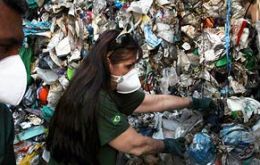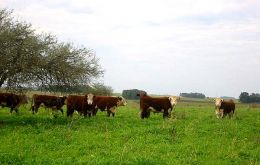MercoPress. South Atlantic News Agency
Health & Science
-
Monday, August 10th 2009 - 11:37 UTC
South America agrees on price ceilings for the A/H1N1 vaccine

South America's twelve nations on Saturday pledged to respect regional vaccine price ceilings to prevent businesses from exploiting fear of the A/H1N1 flu pandemic, Ecuador's Health Minister Caroline Chang said.
-
Thursday, August 6th 2009 - 16:09 UTC
Hazardous waste illegally sent to Brazil returned to UK

Brazil announced it was returning 1.500 tonnes of hazardous waste that arrived from Britain labelled as recyclable plastic. The Brazilian Institute of Environment and Renewable Natural Resources said 89 containers left for Felixstowe, UK from the port of Santos on board MSC Oriane.
-
Thursday, August 6th 2009 - 03:40 UTC
The future of Antarctic science will depend on international cooperation

The National Antarctic Programs have reached a consensus that international cooperation will be the clue for the future development of polar science. This is the main topic of discussion at the XXI Annual Meeting of the Council of Managers of Antarctic Programs (COMNAP), especially with increased costs associated with support, logistics and infrastructure necessary to carry out the scientific research in the White Continent.
-
Tuesday, August 4th 2009 - 12:45 UTC
Strengthening international cooperation is the main challenge of Antarctic meeting

With the challenge of strengthening international cooperation for development of Antarctic science, the XXI Annual Meeting of the Council of Managers of National Antarctic Programs (COMNAP) started yesterday. COMNAP is one of the most important forums of the Antarctic Treaty System.
-
Friday, July 31st 2009 - 12:18 UTC
Airbus recommends changing speed sensors for US made pitots

Plane manufacturer Airbus has urged airlines to change the make of the majority of speed sensors on about 200 long haul aircraft. Airbus has issued a bulletin to airlines recommending that they switch the parts, also known as pitots, to those made by US manufacturer Goodrich.
-
Friday, July 31st 2009 - 12:04 UTC
Punta Arenas hosts next week Antarctic science programs summit

Chile will host the next annual meeting of the Council of Managers of Annual Antarctic Programs, CMNAP, which convenes 26 countries, reported the organizers. The host city will be Punta Arenas in the extreme south of Chile and headquarters of Chile’s Antarctic Institute.
-
Monday, July 27th 2009 - 11:59 UTC
Majority of Argentine women dissatisfied with their bodies and looks

An overwhelming majority of Argentine women, 95%, are dissatisfied with their bodies and the main reason is over weight, according to a public opinion poll released Saturday by one of Buenos Aires main dailies, Clarin.
-
Saturday, July 25th 2009 - 10:40 UTC
Mercosur leaders suggest lifting patent rights to produce anti A/flu vaccines

Speaking in the framework of Mercosur summit in Paraguay, the leaders of Argentina and Brazil suggested Friday that developing countries be allowed to lift patent rights so they can produce more vaccines to battle the A/H1N1 virus flu pandemic.
-
Friday, July 24th 2009 - 14:20 UTC
Brazil to complain UK “dumping” of 1.000 tons of hazardous waste

The Brazilian government said it will lodge a formal complaint with the World Trade Organisation over shipments of more than 1,000 tons of hazardous waste which arrived from Britain
-
Friday, July 24th 2009 - 14:00 UTC
Major world campaign against Foot and Mouth Disease

A major offensive aimed at bringing Foot and Mouth Disease (FMD) under global control has been launched by FAO and the Paris-based World Organisation for Animal Health (OIE).